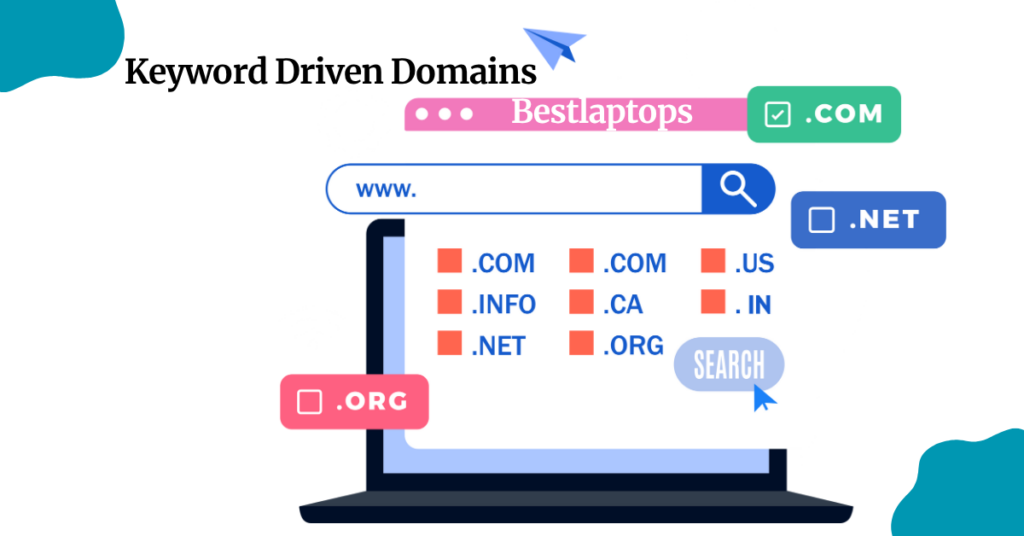If you’re planning to buy a domain name you’ve probably asked yourself this question: Does having a keyword in a domain name still help with SEO in 2025?
For years, we have believed that the more keywords you can stuff into your web address, the better your site will perform in search engine optimization (SEO).
It sounded simple, but the truth today is far more complex.
Search engines have evolved, especially the Google algorithm, which now looks at many different SEO ranking factors 2025 beyond just words in a URL.
How Google ranks sites today depends on intent, authority, content quality, and user experience, not just your domain.
Let’s break this down and understand what happens when you use a keyword in a domain name for SEO.
The Myth vs. Reality of Keyword-Driven Domains

In the early 2010s, websites with Exact Match Domain (EMD) names, like bestlaptops.com, often dominated the search engine results page (SERP).
Google’s old system used to reward that kind of keyword placement heavily. It saw the keyword in a domain name as a strong ranking signal, assuming the site was relevant to that term.
But times have changed.
Through years of Google’s algorithm updates, those shortcuts no longer hold the same power. In fact, Google no longer prioritizes keywords inside domains as much as before.
The modern algorithm now evaluates a site’s content relevance, authority, and trustworthiness instead of just scanning for matching words.
So while a keyword in a domain name can still influence how users see your site, its low ranking impact means it’s only one small piece in a much larger SEO picture.
What Google Actually Looks for in 2025
When you think about search engine optimization (SEO) in 2025, imagine a system that can read, learn, and analyze like a human. The Google algorithm no longer reads your web address; it studies the intent behind your content.
It assesses whether your page really helps people. It checks page experience, content quality, backlinks, domain authority, and how users interact with your site.
In short, Google wants to show results that users actually like and trust.
The words in your domain name can still signal what your site is about, but the algorithm cares more about your relevance, user experience, and authority. The better your content fits user intent, the stronger your organic reach and search visibility become, even if your domain doesn’t have a keyword at all.
Keywords in the Domains Still Have a Place, Just Not the Way You Think
Let’s be honest: people still notice domain names. If someone searches for “affordable hosting,” and your site is affordablehosting.com, that feels clear and easy to remember.
That’s where a keyword in your domain name still makes sense. It helps with better memorability, brand recognition, and sometimes even improved CTR (click-through rate).
However, these are indirect SEO benefits.
A keyword in your domain might boost the way users perceive your brand, which can contribute to more clicks and shares. But it doesn’t directly make your page rank higher.
In other words, the impact of domain keywords today is more about perceived credibility than raw ranking power.
Domain keywords help your audience understand your focus, but won’t override poor content relevance or weak domain authority.
So, while using a keyword in a domain name for SEO might offer some high relevance and enhanced visibility, the trick is to do it naturally. Think “natural keyword usage”, not forced or spammy stuffing.
Exact Match vs Partial Match Domains: Which Works Better in 2025?
There’s a big difference between Exact Match Domain (EMD) and Partial Match Domain (PMD).
An EMD uses the entire keyword phrase, like cheapflights.com. A PMD, on the other hand, includes the keyword but blends it with a brand name, like FlyCheaply.com.
In 2025, Google clearly prefers the second option.
Why?
Because PMDs feel more organic. They fit real brands, not just search queries. EMDs, while still recognized, can raise spam potential if overused.
When the Google algorithm evaluates your domain name relevance for SEO, it checks if your domain feels like a real business or a keyword trap.
Partial match domains often strike that healthy balance between strong branding and natural keyword usage.
So, if you’re planning your next site, choose SEO-friendly domain ideas that sound human, trustworthy, and easy to remember, not robotic keyword strings.
Why Branding and Trust Now Beat Keywords in a Domain Name
In the world of SEO today, branding is your real power. A well-branded site builds trustworthiness, earns backlinks, and improves user experience. All of which strongly influence search ranking.
Google now measures a brand’s domain authority and reputation across the web. When people search for your brand name and click your site, that behavior affects your search performance far more than having a keyword in a domain name.
Think about it like this:
You could have “bestfoodusa.com,” but if your pages load slowly, your writing is weak, or users bounce quickly, no keyword will save you.
Google’s algorithm updates now determine rankings based on engagement and quality, not old-school tricks.
So, strong branding, high relevance, and consistent content quality now contribute more to search visibility than keyword stuffing ever could.
How a Smart Domain Name Still Boosts SEO Indirectly
While the direct ranking boost from domain keywords has weakened, the right domain name still has power.
A clear, short, and relevant domain name builds website credibility. It improves your click-through rate (CTR) because users instantly understand what you offer. It also boosts organic traffic since people are more likely to trust and click a familiar-sounding name.
A smart domain supports SEO best practices for domain naming. It makes people remember you, link to you, and share your content. This leads to more backlinks, higher domain authority, and overall search visibility improvement.
So yes, keywords can still influence SEO, but in an algorithm-neutral way. They affect behavior, not rankings.
The stronger your name connects with human readers, the better your site performs over time.
Mistakes That Still Hurt Your Domain’s SEO Power
Even in 2025, many website owners make the same old mistakes when choosing a domain name. The first one is over-optimization.
Adding too many keywords makes your site look suspicious. A name like “best-cheap-fast-web-hosting-usa.com” screams low trust.
Search engines notice that. Too many hyphens or repetitive words reduce the domain trust score and increase spam potential.
Another mistake is ignoring domain length and brand recognition. A long, clunky name hurts user memory and click-through rate.
Finally, neglecting content relevance is the biggest sin.
Even if your domain name sounds perfect for SEO, if your site content doesn’t correlate with it, Google’s algorithm will quickly catch on and adjust your search ranking downward.
Remember: SEO best practices for domain naming focus on clarity, user intent, and trustworthiness, not manipulation.
Choosing the Right Domain in 2025: Balance Over Keywords
So how do you optimize your domain name for today’s SEO world?
Start by keeping it simple, brandable, and relevant. Choose a domain name that aligns with your niche but also sounds human.
Make sure it’s easy to type, say, and remember. This helps with better memorability and organic reach. Use a reliable top-level domain (TLD), like .com or .net, to enhance perceived credibility.
If you want to include a keyword, that’s fine, but make it fit naturally. For example, instead of “besthostingproviders2025.com,” something like “HostPro.com” or “SwiftHosting.com” feels cleaner.
Keep your optimization level balanced. Don’t let keywords overpower your brand identity.
When your domain reflects real value, not just SEO tactics, Google algorithm sees it as a trustworthy brand.
A balanced name also improves page experience, user trust, and long-term ranking stability, everything modern SEO values more than keyword density.
SEO Is About People, Not Just Domains

Search engines are getting smarter every year. What they really evaluate now is how well your website helps users.
A great domain name may get you noticed, but engaging content, helpful structure, and strong authority keep you on top.
Even if you use a keyword in a domain name, your success depends on your ability to improve content quality, optimize for speed, and boost user experience.
In simple terms, SEO in 2025 is about meaning, not matching.
The Google algorithm tries to understand context. It analyzes your pages to see if they truly solve the searcher’s problem.
So don’t obsess over having the perfect domain keyword. Focus instead on offering genuine value.
That’s what really drives search performance and organic traffic today.
Keywords Don’t Rank — Brands Do
After everything, here’s the honest truth. Having a keyword in a domain name can still help, but only a little. It can signal relevance, influence clicks, and improve brand recognition, but won’t make you rank higher alone.
The weak direct correlation between keywords and rankings means that in 2025, Google’s algorithm rewards meaning, not manipulation.
Strong branding, trustworthiness, and consistent content quality now matter most.
So, if you want your site to stand out, don’t chase old-school tricks.
Build a name people can remember. Make your content worth visiting. Earn your domain authority with time and backlinks.
Your domain name can still contribute to success but only when it supports a site that truly helps people.
That’s the real impact of domain keywords in modern SEO: small in code, massive in connection.
Keyword in a Domain Name for SEO FAQs
Having a keyword in your domain name can still help SEO slightly in 2025, but only indirectly. It may improve click-through rate (CTR), brand recognition, and user relevance. However, the Google algorithm no longer prioritizes keywords alone as a ranking signal. Content quality, user intent, backlinks, and domain authority are now far more important for search visibility.
In 2025, Partial Match Domains (PMDs) will work better than Exact Match Domains (EMDs). PMDs naturally blend branding and relevance without looking spammy. Exact Match Domains used to boost rankings, but now have a low ranking impact under Google’s modern algorithm.
Yes. A clear keyword in a domain name can improve click-through rate (CTR) by signaling relevance to users. People are more likely to click a link that matches what they searched for, even though it doesn’t directly influence Google’s ranking system.
In 2025, the main SEO ranking factors include content relevance, page experience, backlinks, authority, and trustworthiness. Branding and user experience have become stronger ranking signals than having a keyword in the domain.
Choose a domain name that is short, memorable, and relevant to your niche. You can include a keyword if it fits naturally, but prioritize branding, trust, and user experience. Avoid spammy or over-optimized names with multiple hyphens or unnecessary keywords.